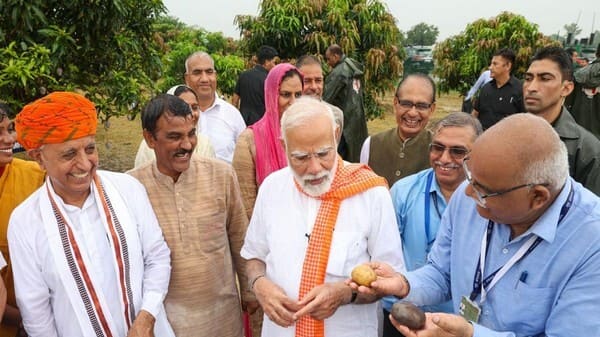
PM Modi releases 109 climate-resilient seed varieties
What's the story
Prime Minister Narendra Modi unveiled 109 high-yielding, climate-resilient, and biofortified crop varieties at the Indian Agricultural Research Institute (IARI) in New Delhi on Sunday.
This initiative is part of the government's broader strategy to rejuvenate agriculture and enhance food security in the country.
Union Agriculture Minister Shivraj Singh Chouhan stated that the seeds and planting materials were introduced at three locations in demonstration fields of the Indian Council of Agricultural Research (ICAR).
Crop diversity
Crop varieties developed for India's diverse agro-climatic zones
The 109 crop varieties include 34 field crops and 27 horticultural traits, covering a wide range of produce such as wheat, rice, vegetables, oilseeds, and cotton.
Field crops, grown on a large scale for commercial purposes, are vital for food supply, livestock feed, and as raw materials for various industries.
Horticultural crops like fruits, vegetables, nuts, herbs, and flowers play a significant role in nutrition and industries including food and pharmaceuticals.
Crop traits
New varieties exhibit climate resilience and pest resistance
The new crop varieties are drought-tolerant, climate-resilient, and pest-resistant.
They also possess additional traits such as disease tolerance, salinity tolerance, flood tolerance, heat tolerance, cold tolerance, and the capacity to thrive in nutrient-deficient soils.
These varieties have been specifically developed considering India's diverse agro-climatic zones.
Chouhan emphasized the government's focus on a "lab to land" approach to ensure that "science reaches the farmer directly."
Budget announcement
Modi government's 'Viksit Bharat' vision prioritizes agricultural productivity
In her budget speech on July 23, Finance Minister Nirmala Sitharaman underscored productivity and resilience in agriculture as key priorities for realizing the government's "Viksit Bharat" vision.
She announced a comprehensive review of the agricultural research setup with a focus on enhancing productivity and developing climate-resilient varieties.
The seeds among the 109 varieties are primarily developed by ICAR and are indigenous, carefully chosen for their suitability to local conditions.
Market growth
Seed market in India projected to reach $5.01 billion
Field trials of these new varieties have shown adaptability and a significant increase in yield, underlining their potential to boost agricultural productivity while preserving local biodiversity.
The seed market in India is estimated to be worth $3.61 billion in 2024 and is projected to grow to $5.01 billion by 2030.
Over the past decade, the government has introduced around 2,100 climate-resilient crop varieties to farmers, including rice varieties that require 25% less water than traditional ones.